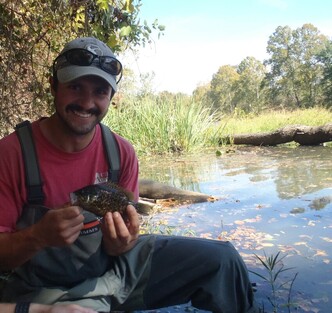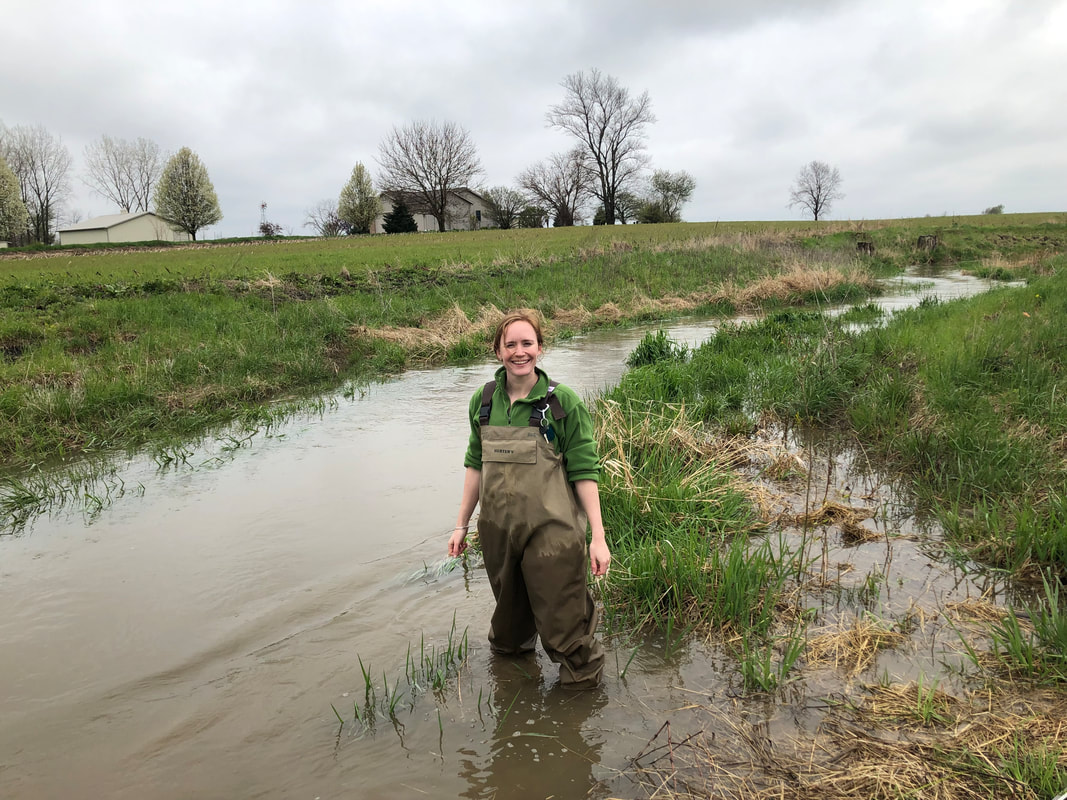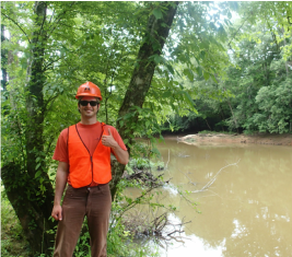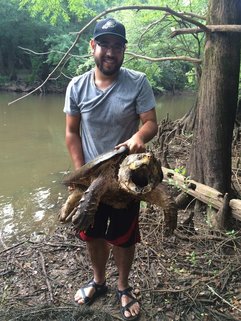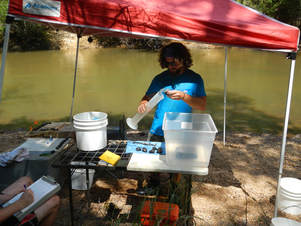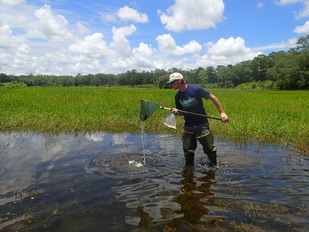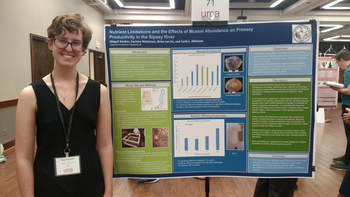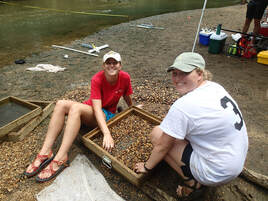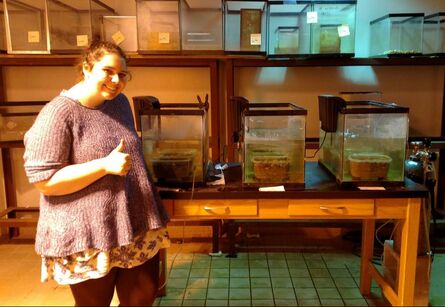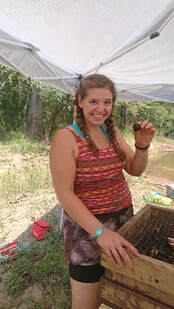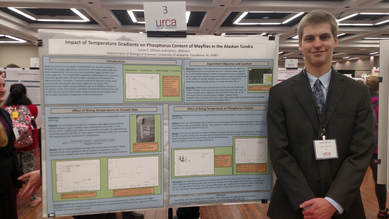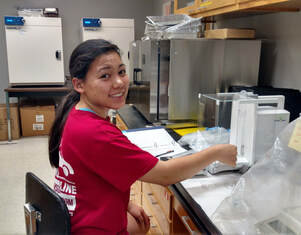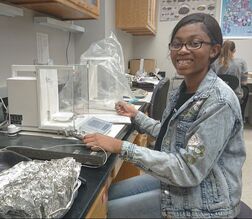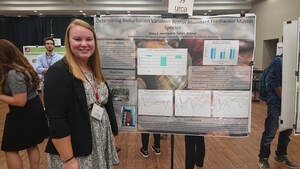Lab Alumni
Postdoctoral Researchers
|
Dr. Garrett Hopper
Ph.D. Biology, Kansas State University M.S. Biology, Kansas State University B.S. Natural Resource Ecology and Management: Fisheries and Aquatic Ecology, Oklahoma State University I am an aquatic ecologist with broad interests in community ecology, ecosystem structure and function, and conservation biology. My research addresses two basic themes: 1) identifying patterns and processes regulating species diversity and habitat associations of stream organisms; 2) influence of global change on the relationship between diversity and stream ecosystem function. I combine field, mesocosm, and laboratory studies to understand these interactions and processes. See his personal website to learn more. Garrett was working on the Mussels Dimensions of Biology project and is now an assistant professor in the School of Renewable Natural Resources at Lousiana State University. Dr. Shannon Speir
Ph.D. Biological Sciences, University of Notre Dame M.S. Crop, Soil, and Environmental Sciences, University of Arkansas B.S. Biology and Spanish, Texas Christian University I am an ecosystem ecologist and stream biogeochemist interested in stream ecosystem function and nutrient transformations in both human- and climate-impacted freshwater systems. My research combines both field and laboratory studies, as well as the use of high-frequency sensing, to determine the mechanisms driving biogeochemical transformations and nutrient transport. I also aim to ground my research in translational ecology, in which my findings have real world impacts on conservation/restoration efforts and policy. To learn more, see her website. Shannon was working on the Aquatic Intermittency effects on Microbes in Streams (AIMS!!) project and is now an Assistant Professor at the University of Arkansas |
Graduate Students
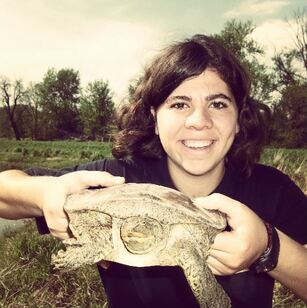
Irene Sánchez González
Ph.D. Biology, University of Alabama
M.S. Biology, Arkansas State University
B.S. Biology, Missouri Valley College
I am interested in the diversity of traits of freshwater mussels, including morphology and nutrient storage, and how those traits vary across environmental gradients. I plan to study the i influence that mussel diversity has on ecosystem functioning with lab experiments and field observations in several streams draining into the Tennessee and Mobile River Basins. Some of my previous research includes: land use impacts on water quality and the influence of river habitat on freshwater mussel community structure.
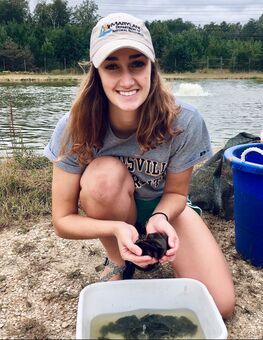
Megan Kubala
M.S. Biology, University of Alabama
B.S. Biology, Millersville University
My previous research projects have included studying the bioaccumulation of PCBs in aquatic systems and nutrient assimilation in the freshwater mussel Elliptio complanata. My broad research interests include aquatic ecology, conservation biology, and microbial ecology. I am interested in studying how mussel species diversity influences sediment microbial community structure as well as how sediment microbial species composition impacts large-scale ecosystem processes. For my graduate research, I’ll be working in collaboration with the Mussels Dimensions of Biology project.
Thesis Title: Freshwater mussel-mediated nutrient fluxes and burrowing behavior influence ecosystem functioning
M.S. Biology, University of Alabama
B.S. Biology, Millersville University
My previous research projects have included studying the bioaccumulation of PCBs in aquatic systems and nutrient assimilation in the freshwater mussel Elliptio complanata. My broad research interests include aquatic ecology, conservation biology, and microbial ecology. I am interested in studying how mussel species diversity influences sediment microbial community structure as well as how sediment microbial species composition impacts large-scale ecosystem processes. For my graduate research, I’ll be working in collaboration with the Mussels Dimensions of Biology project.
Thesis Title: Freshwater mussel-mediated nutrient fluxes and burrowing behavior influence ecosystem functioning
|
Daniel Knapp M.S. Biology, University of Alabama B.S. Biology, Pennsylvania State University My previous research projects have included anti-predator behavior between southern toads and invasive fire ants, and the effect of prescribed fire on vertebrate behavior. I have wide research interests which include animal behavior, predator-prey interactions, reptile and amphibian morphology, and ecological stoichiometry. For my graduate research, I am interested in studying how amphibians can affect their ecosystem, other species, and different trophic levels. My work takes place in geographically isolated wetlands at the Joseph W. Jones Ecological Research Center in Newton, GA. Thesis Title: Developmental shifts and life-history traits affect larval anuran stoichiometry: A framework for understanding the role of larval anurans in wetland ecosystem nutrient storage Publications: Knapp, D.D.*, L.L. Smith, and C.L. Atkinson. 2021. Development and life-history traits affect larval anuran stoichiometry: understanding the role of larval anurans in wetland nutrient storage. Ecosphere 12, e03466 Dan is now a PhD student at Clemson University studying hellbenders. |
Zach Nickerson
M.S. Biology, University of Alabama
B.S. Biology and Chemistry, Indiana State University I study the influence of freshwater mussel communities on sediment biogeochemistry. My thesis research involves 1) studying how species-specific mussel traits influence sediment biogeochemistry through the alteration of sediment distribution and characteristics, and 2) how changing mussel community structure influences nitrogen cycling in the Sipsey River, AL. My general research interests are biogeochemistry and ecosystem ecology. What interests me the most are organisms that provision biogeochemical ecosystem functions in aquatic systems. Thesis title: Influence of native freshwater mussel functional traits and community structure on nitrogen removal in stream sediments Publications: Nickerson, Z.L.*, P.A.M. Green, L.N. Shouse, C.L. Atkinson. In press. Enhanced species richness of functionally similar stream consumers results in higher ecological function. Freshwater Science. Nickerson, Z.L.*, B. Mortazavi, C.L. Atkinson. 2019. Using functional traits to assess the influence of burrowing bivalves on nitrogen-removal in streams. Biogeochemistry 146: 125-143. Zach is now a research associate at the National Ecological Observatory Network in the Aquatics department in Boulder, CO. |
Visiting Scholars
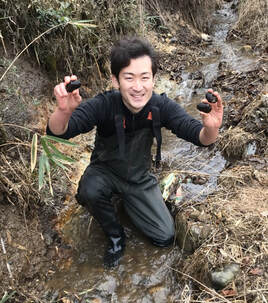
Isao Sano
International Student from Japan
Ph.D. Student, Life Sciences, Tohoku University, Japan
Master of Education, Education, University of Yamanashi, Japan
Bachelor of Education, Education, University of Yamanashi, Japan
I am interested in the mechanisms of evolution in organisms. Specifically, I am using freshwater animals as an example to investigate the impacts of habitat on species diversification. So far, I have elucidated the evolutionary history of freshwater mussels (Unionidae and Margaritiferidae, Unionoida) and eight-barbel loaches (Balitoridae, Cypriniformes) living in East Asia. In the future, I plan to examine the parallel evolution of freshwater organisms living in East Asia and North America.
International Student from Japan
Ph.D. Student, Life Sciences, Tohoku University, Japan
Master of Education, Education, University of Yamanashi, Japan
Bachelor of Education, Education, University of Yamanashi, Japan
I am interested in the mechanisms of evolution in organisms. Specifically, I am using freshwater animals as an example to investigate the impacts of habitat on species diversification. So far, I have elucidated the evolutionary history of freshwater mussels (Unionidae and Margaritiferidae, Unionoida) and eight-barbel loaches (Balitoridae, Cypriniformes) living in East Asia. In the future, I plan to examine the parallel evolution of freshwater organisms living in East Asia and North America.

